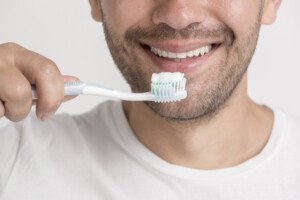
Good oral health will help keep your teeth and gums looking good for a long time.
There are 10 signs that will help you know if you’re headed in the right direction with your mouth.
- Pink Gums
When your gums are healthy, they’ll be pink. If they’re red or white, it means they are not healthy.
Red indicates the presence of inflammation, and white reveals a lack of blood – which means a weak immune system.
- No Bleeding When You Brush or Floss
Healthy gums do not bleed. If you have bleeding gums, it is because you have gum disease.
If the only symptoms are that your gums bleed and are red or inflamed, you have gingivitis.
If they bleed more heavily; your gums have pulled away from your teeth; there are pockets on your gums with pus at the gum line; your gums are receding; and spaces have developed between your teeth – you have periodontitis.
You will need to see a dentist for periodontal treatment.
- Receding Gums
If you have noticed that your teeth are appearing longer and your gums shorter, it is because they are receding.
Gum recession is not a good thing. There are a couple of reasons for this.
The first is that you may be brushing too hard or using a toothbrush with hard bristles.
Since it does not take much effort to remove plaque, use a soft-bristled toothbrush.
A second reason for receding gums is that you have gum disease.
This is primarily caused by a lack of good oral health – you are not brushing your teeth and flossing as often as you should.
- Yellow Line at the Gum Line
Plaque is that clear film that forms on your teeth every day.
When you do not remove it very often – or very carefully when you do brush – it will harden at the gum line and edges of your teeth and become tartar.
Tartar cannot be removed by a toothbrush, so you will need to go to a dentist for a dental cleaning. If you leave it alone, it will cause gum disease.
- Bad Breath
Bad breath, also called halitosis, is caused by the presence of bacteria.
It produces sulfide gas as a byproduct, which is what you smell.
It is responsible for causing cavities, inflammation and gum disease.
If you have bad breath, you will need to have the dental problem repaired to get rid of it.
- Missing Teeth
Missing teeth may indicate poor dental hygeine.
When missing teeth are not replaced with bridges or dental implants, the remaining teeth will drift, causing them to become misaligned. This will make them harder to keep clean.
Also, the bone under a missing tooth will be partially reabsorbed, making the jawbone thinner and weaker.
- Cavities
Although they cannot be completely prevented, cavities should be treated in the early stages to prevent the need for extraction – which could occur if left alone.
Brushing or flossing more often can help prevent cavities, especially when you also reduce your sugar intake and drink fewer acidic drinks – or at least be sure to rinse your mouth out with water afterward.
Cavities are caused by the natural bacteria in your mouth.
They feed on sugar and carbs and produce acid as a result, which slowly erodes the enamel on your teeth – if it is left on them for long periods.
- Mouth Sores
Your mouth may develop sores of different kinds.
They may be caused by very hot foods, accidentally biting the inside of your cheek or tongue, and more.
You may also develop infections from viruses, bacteria or fungi.
One thing that you especially want to watch for is a sore that does not heal within two weeks.
If that happens, be sure to see a dentist for an oral exam – it could be oral cancer (which can be fatal).
Dentists can also detect other diseases, too — often before other medical specialists.
- Teeth Sensitivity
As the enamel on your teeth erodes, holes and pits are created in it that allow food particles to pass through it and the softer dentin, to the nerve.
This will create sensations of pain when certain types of foods or temperatures affect your teeth. Sensitive teeth will usually occur before a cavity – but not always.
- Dry Mouth
If your mouth frequently feels dry, it means that you are headed for possible oral trouble.
Your saliva helps to naturally wash away some of the bacteria and acid from your teeth, which helps prevent cavities.
When you do not have enough saliva for this to occur, it allows the bacteria to multiply and produce more acid.
The acid will erode your tooth enamel faster and irritate your gums – leading to gum disease.
Dry mouth can be caused by diabetes and other diseases, as well as many medications.
Staying hydrated through the day can help you avoid this problem.

Dr. Vadivel, DDS, is a board certified periodontal surgeon, and Founder-CEO of Implants & Gumcare of Texas, offering affordable restorative and cosmetic dental procedures. Dr. Vadivel has over 25 years of experience.
.









































